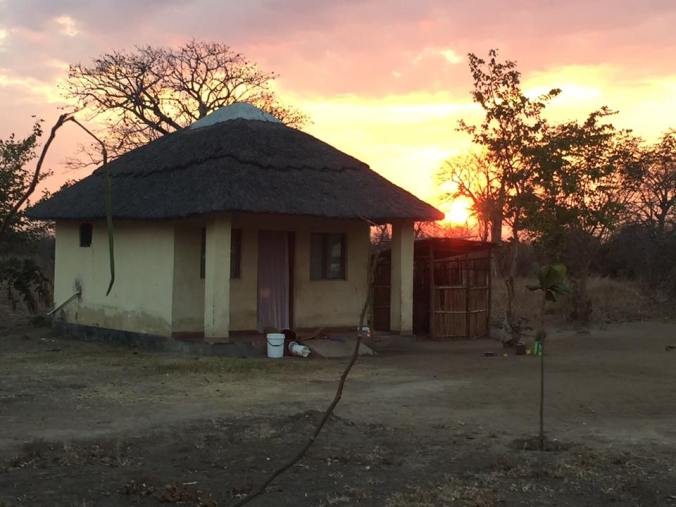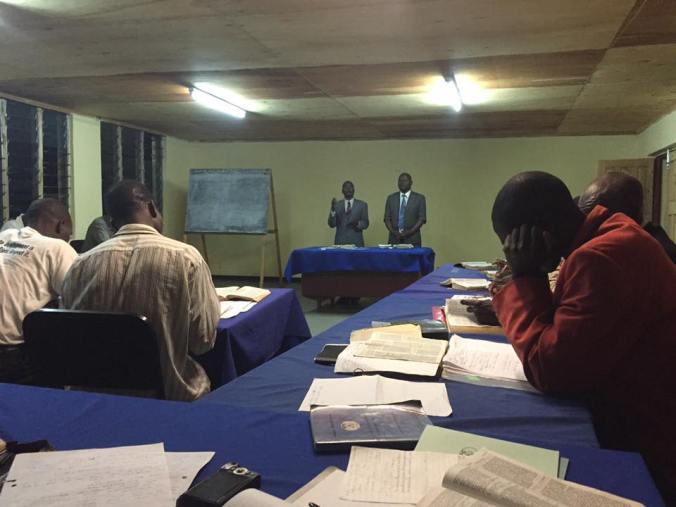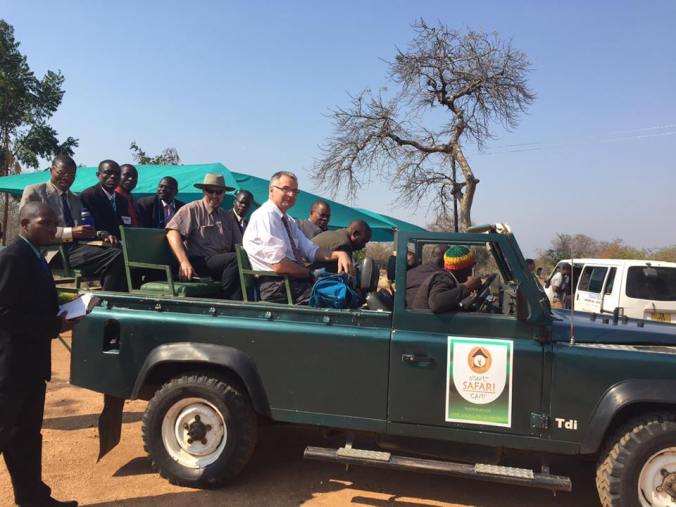We arrived in Malawi safely on Wednesday 24th 2016 at around 12.30, and were met at the airport by pastors Rex Chitekwe and Precious Kanyowe and their wives, and Pastor Royd Weyer.
After warm greetings we presented the brethren with three suitcases full of Shorter Catechisms in Chichewa that brothers Tim Law and Earnest had helped to have printed. These were received with expressions of deep gratitude. After farewelling Febbe Chitekwe and Katherine Kanyowa we were ready to head off for the training centre. We stopped off at the local shops to obtain a phone card and some provisions, and from there it was off to the Bible Society of Malawi to purchase Bibles (110) with funds that some brethren had donated for that purpose. The arrangement was that at a later date, the EPCM Deacons would arrange for the distribution of these bibles to the poorest of the members who lost their Bibles in the floods. From the Bible Society we headed off on the 2 hour road trip to Liwonde. It was around 42 hours travel time from when we left Tasmania when we arrived.

The training was to take place at Ngomz Saffari Lodge, which is tucked in under a range of hills at the entrance to Liwonde national park. This is a typical African/Malawian constructed and run complex; with rendered local brick walls, thatched roofs, and very sporadic power and water. The power and water was functional, available about 1/3 of the time. The whole region was tinder dry, having received no rain for 18 months. Our driver, Gideon, tells us that in Blantyre many people are cueing for two days at a time to get drinking water from the few outlets, and here in Liwonde the villagers are digging down into the dry creek beds 1.5 metres to find water. The need for rain is dire.
The Ngomz safari lodge is well suited to the training. We are housed in two small thatch roofed huts, and the students are in a dorm. We all have the luxury of a mosquito net over the beds. That is a good thing, as this venue is not far from the Shire River and its swampy borders, and there is no shortage of mosquitos; they are hungry and arrive in swarms just before dawn and at dusk. Between repellent and the nets over the beds we hope to get by without contracting Malaria, which is very common in this area. We meet for training in a good sized room in another larger thatch roofed building, with the mozzies; and share the Bushman’s repellent with the students when the sun sets.
We have 19 students and 5 ministers attending the training this time. These students come from all regions in which the EPC Malawi and Mozambique have their work. It is especially encouraging to the EPCM ministers that there are 4 students from Mozambique, because there are no ministers living in Mozambique. The work of EPCM is still growing, and as the work grows the demand for ministry grows along with it. There are now some ten thousand people waiting on the ministry of EPCM in Mozambique and another twelve thousand in Malawi. Even while we have been here for this ten days, there has been growth. On two occasions delegations of men have arrived at the training centre to meet with the ministers. One delegation rode their push bikes from 70 km away in Liwonde, representing some 12 families. They had heard about the Reformed faith, which they call “the strong faith”, and sent a delegation to request that they might receive this teaching. A few days later, another group of men, this time from the other direction, cycled over 100 km to make a similar request. Then, next day, the EPCM ministers received a letter from a minister of the CCAP (Church of Central Africa Presbyterian) requesting to be received into the ministry in the EPCM, as he wanted to be part of “the church that is carrying out the great commission in Malawi”. Pastor Rex read part of this letter to the students to encourage them, and told them that this man would not be received unless and until he received the same training they were receiving and showed himself to be committed to the Reformed faith. These things encourage the men, but they are taken in stride. They are not uncommon occurrences. And… the ministers are aware that each new request means they will required to extend their preaching circuits wider still.

The training has gone on well. Each day’s work begins with a breakfast of either sweet potatoes and tea, or a few pieces of bread and tea. Then the studies commence at 8-8.30 and, with breaks for lunch and tea, continue on till around 9-9.30 pm. The men request that the schedule be as full as can be. They are more than willing to give their all to concentrate and learn all they can, while they can. It is a privilege to have the opportunity to share Reformed and Presbyterian heritage with them. The studies this time were designed to help the men to work practically with the principles of biblical interpretation that were introduced last visit. Since our last teaching visit they had been working on assignments that kept them working with these principles, along with reading assignments through the Old and New Testaments. Pastor Lim had set exegetical assignments through Ephesians, and Pastor Connors had set assignments through the gospel of Luke and the book of Galatians. Pastor Chitekwe has been given oversight of and has been diligent in overseeing the students: visiting, encouraging, gathering their assignments and marking them. Each student was given a ring folder in which they keep all their assignments, notes and grades. Even though we can’t read the Chichewa of most of the students, the folders do enable us to view each student’s work and gain an idea of who had shown commitment to their studies.
Our focus is on preparing the most able of these men with a Reformed foundation and the ability to exegete and preach the Word – as soon as is possible. Teaching through an interpreter makes it difficult to know how much of what is taught is being understood – really understood – in a way that can actually be faithfully put into practice. With that in mind, we decided to change up our method of instruction. We would teach the principles and then workshop those principles. The hope was that this would reveal what is being understood and enable us to do what it takes to make sure that what is taught is actually grasped.
With this plan in mind, in the months prior to this teaching visit the students were allocated a passage from both Luke and Galatians to study in detail. Then they were to prepare two “sermons” that they would deliver in the training sessions. These sermons would not only engage the students, but also reveal where they “are actually at”, and would become the contact point from which we would lead the class, step by step, through the way the texts can be interpreted using the principles and practices we had learned.
When this “new way” was explained to the men they were excite and eager to begin. Thereafter, we had a mixture of instruction and workshop. We reviewed the principles of Reformed biblical interpretation (grammatical, historical, spiritual), and studied in some depth the way Christ was represented in the types and symbols under the Old testamentary dispensing of the covenant. This was new and exciting for the students, and many of them seemed to be grasping the concepts clearly.
In our workshops the students were all required to assess the preaching on 6 defined categories: context, exegesis, doctrine, Christ-centred, organisation, and delivery. After the sermon we went round the class, with each student giving his assessment. The first one to address each category had to first give the definition of that category (to make sure that he knew what it involved and stayed on point), then he gave his assessment. We had two sermons in the morning and two after the evening meal. After the class had given their assessments we worked through the passage together, beginning with the context and working through the exegesis, and demonstrating how each passage and doctrine that it contained centred in the person and work of Jesus Christ. The students thoroughly enjoyed the new format, and when we needed some more sermons, there was no shortage of volunteers. As the days passed it was evident that the men were beginning to grow in their understanding and skills. Their assessments were becoming more accurate and more discerning. As we proceeded the blank spots in their understanding and the areas that needed more work became clear, and we were able to put some step by step processes in place to help them as they become more seriously engaged in the work of exegesis and sermon preparation.
These workshops were also opportunities to instruct the students in the key doctrines that arose from the texts, and reinforce with them the truth that our confession rises out of the Scriptures.
At the EPCM ministers request, we also gave instruction in the Christian Sabbath, why we baptise infants and adults, the mode of Baptism, and why we don’t observe the “Christian Calendar” and “Holy days” so called.
Meanwhile, Phil Connors was busy keeping everything working smoothly behind the scenes and keeping the water and mozzie repellent up to us all, Jonathan Burley was busy repairing and servicing the 5 motor bikes that the ministers use in their circuit preaching.
 On the two Lord’s days we travelled (in vehicles loaned by the Lodge owner) to congregations with all the students. The trip was a bit like taking a safari – with about 12 men loaded into an open jeep. Pastor Connors preached sermons at both places. The visit by three brethren from Australia was received with expressions of gratitude and joy. We were also able to observe the distribution of some of the Catechisms we carried with us from Australia. The brethren received them with wonderment and delight! Neither of the congregations we visited had enough food to be able to share, which was a great trial for them as it is a shameful thing in Malawi not to provide a meal for your guests. We met one elderly woman who had not eaten for four days, but came along to worship with a warm smile and shook our hands with a firm grip.
On the two Lord’s days we travelled (in vehicles loaned by the Lodge owner) to congregations with all the students. The trip was a bit like taking a safari – with about 12 men loaded into an open jeep. Pastor Connors preached sermons at both places. The visit by three brethren from Australia was received with expressions of gratitude and joy. We were also able to observe the distribution of some of the Catechisms we carried with us from Australia. The brethren received them with wonderment and delight! Neither of the congregations we visited had enough food to be able to share, which was a great trial for them as it is a shameful thing in Malawi not to provide a meal for your guests. We met one elderly woman who had not eaten for four days, but came along to worship with a warm smile and shook our hands with a firm grip.
After this visit and learning of the needs of this woman and many like her, we were able to encourage the ministers to prepare a pastoral letter to all their congregations (over 100) and prayer houses urging the deacons to be busy looking out for and visiting the elderly and those who might have no one to notice them and be dying all alone. A donation of several hundred dollars had been given for food relief before we came on this trip, so we were able to immediately direct that money to be used for this relief.
Back to the training for a moment. We were informed that there are another twenty (20) young men who are currently completing their schooling who have applied to become students for the ministry in the EPCM. These young men have been told that they must first obtain a high level of competency in English, both written and spoken, so that they can read theological material and be taught in English. The need to train men for the ministry in Malawi and Mozambique is ongoing.
Currently there are five ministers servicing more than one hundred congregations in Malawi and Mozambique. Of the nineteen students there are six or seven who almost certainly could, and another seven or eight who may be able to sustain an examination and be licenced to preach. The ministers of EPCM are hoping that both pastors Lim and Connors will be able to help them with an examination of the students either at the end of this year, or more likely, in April of next year. In the interim the students will be required to do the assignments that continue to be set, and prepare themselves for an examination by reviewing all that they have been taught, and by studying the Westminster Confession and Catechisms. And, of course, they will be praying for rain, tilling their fields and doing whatever they can to keep their families alive and functioning in the extreme challenges of the present famine.
This trip has been an enjoyable experience. We are gaining a much better understanding of Malawi and its culture, and this deepens with each stay. We feel quite at home. Our relationship with the ministers is now well established, warm, open and relaxed, and this visit with its interactive format has enabled us to get to know each of the students as well. It was also evident to us that the EPCM has matured. It has deepened in its understanding of and commitment to the Reformed faith and life in the past two years. EPCM is witnessing the power of God to gather multitudes to their ministry. They express their amazement that, contrary to what they feared and anticipated, needy souls are drawn to the biblical Reformed faith, (set forth in the Shorter Catechism in their own language), like moths to a light shining in the darkness. They tell us that they are amazed and humbled – and that they are also committed to try to build what is so evidently a work of God into a church in Africa that is true and can be faithful into the future. It is a privilege to stand with them.
Please remember them in your prayers. Pray for all the ministers, students, elders, and especially the Deacons as they care for the needy. Pray that the students will be blessed by God with all the riches of his grace in Christ Jesus, and with the commitment and diligence they need to continue their studies well. Pray for Pastor Rex as he continues to visit them to encourage and to administer and monitor their work. And pray for all these brethren in their need, especially the sick, the elderly, the widows and the orphans.
Yours in His service,
Chris and Phil and Jonathan.


